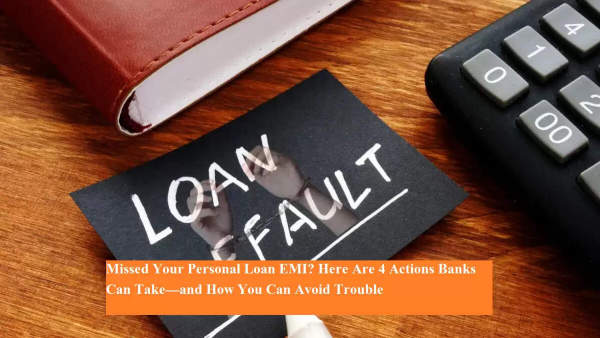
In today’s fast-paced financial world, availing a personal loan has become incredibly easy. Whether through pre-approved offers, app-based instant approvals, or just a click online, loans are now more accessible than ever. However, with convenience comes responsibility—and the consequences of missing your EMI (Equated Monthly Installment) payments can be serious.
If you fail to repay your personal loan on time, banks are legally entitled to initiate recovery actions that can affect your financial standing and credit health. According to recent financial insights, here are four actions banks typically take if a borrower defaults on their personal loan, and how you can avoid getting into trouble.
Most banks set up auto-debit facilities to collect monthly EMIs directly from the borrower’s bank account. If this payment fails due to insufficient funds or other reasons, banks levy late payment penalties.
For example:
HDFC Bank charges a penalty of ₹450 for missed EMI payments.
ICICI Bank imposes a penalty of ₹500.
On top of this, there are interest charges on the overdue amount. HDFC charges 1.50% per month (18% annually), while ICICI levies 5% annual interest on late payments.
Some banks offer a grace period of up to 7 days, but relying on that buffer is not advisable.
As per RBI guidelines, banks are required to report delayed EMI payments to credit bureaus such as CIBIL or Experian every 15 days. Even a single missed EMI can significantly lower your credit score, making it harder to get loans or credit cards in the future.
Once damaged, a credit score takes months—if not years—to fully recover, even if you resume timely payments.
If your EMI remains unpaid for an extended period (usually more than 90 days), the bank escalates the matter to recovery agents.
Here’s what happens:
You may receive calls, SMS, emails, or WhatsApp reminders from the bank.
If there's still no response, the case is handed over to a recovery agency.
Agents may visit your home or workplace to remind or request payment.
Your loan guarantor, if any, will also receive a legal notice.
Though regulated, these recovery visits can be uncomfortable and stressful for the borrower.
If reminders and agent visits fail to recover the dues, the bank may initiate legal proceedings. You could receive a formal legal notice, and your loan may be declared a Non-Performing Asset (NPA).
The default will be permanently recorded in your credit history, making it difficult to secure any form of credit in the future—including home loans, car loans, or even simple credit cards.
The good news? These consequences are completely avoidable with a few simple, proactive steps.
Build an Emergency Fund: Keep a reserve fund that covers 6–12 months of EMIs to manage financial stress during unforeseen events like job loss or illness.
Maintain a Healthy EMI Ratio: Ensure your total EMI outgo is no more than 30%–40% of your monthly income. This helps maintain a balanced budget.
Get Adequate Insurance: Medical emergencies are one of the biggest causes of financial distress. A comprehensive health insurance plan can prevent sudden out-of-pocket expenses.
Borrow Responsibly: Understand the purpose of your loan. Avoid taking personal loans for luxury items or non-essential purchases. Prioritize “good debt” that helps generate income or build assets.
Final Thoughts:
Personal loans offer convenience, but defaulting on them can lead to significant consequences—from credit damage to legal action. Being financially disciplined, planning ahead, and borrowing responsibly can keep you out of trouble and on the path to financial stability.